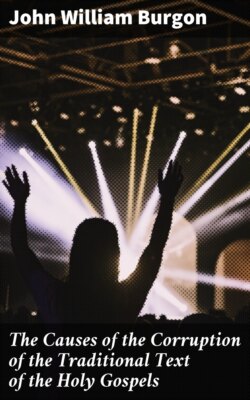Читать книгу The Causes of the Corruption of the Traditional Text of the Holy Gospels - John William Burgon - Страница 29
На сайте Литреса книга снята с продажи.
§ 1.
ОглавлениеTable of Contents
Corrupt readings have occasionally resulted from the ancient practice of writing Scripture in the uncial character, without accents, punctuation, or indeed any division of the text. Especially are they found in places where there is something unusual in the structure of the sentence.
St. John iv. 35–6 (λευκαι εισι προς θερισμον ηδη) has suffered in this way—owing to the unusual position of ηδη. Certain of the scribes who imagined that ηδη might belong to ver. 36, rejected the και as superfluous; though no Father is known to have been guilty of such a solecism. Others, aware that ηδη can only belong to ver. 35, were not unwilling to part with the copula at the beginning of ver. 36. A few, considering both words of doubtful authority, retained neither[61]. In this way it has come to pass that there are four ways of exhibiting this place:—(a) προς θερισμον ηδη. Και 'ο θεριζων:—(b) προς θερισμον. Ηδη 'ο θ.:—(c) προς θερισμον ηδη. 'ο θεριζων:—(d) προς θερισμον. 'ο θεριζων, κ.τ.λ.
The only point of importance however is the position of ηδη: which is claimed for ver. 35 by the great mass of the copies: as well as by Origen[62], Eusebius[63], Chrysostom[64], Cyril[65], the Vulgate, Jerome of course, and the Syriac. The Italic copies are hopelessly divided here[66]: and Codd. [Symbol: Aleph]BMΠ do not help us. But ηδη is claimed for ver. 36 by CDEL, 33, and by the Curetonian and Lewis (= και ηδη 'ο θεριζων): while Codex A is singular in beginning ver. 36, ηδη και—which shews that some early copyist, with the correct text before him, adopted a vicious punctuation. For there can be no manner of doubt that the commonly received text and the usual punctuation is the true one: as, on a careful review of the evidence, every unprejudiced reader will allow. But recent critics are for leaving out και (with [Symbol: Aleph]BCDL): while Tischendorf, Westcott and Hort, Tregelles (marg.), are for putting the full stop after προς θερισμον and (with ACDL) making ηδη begin the next sentence—which (as Alford finds out) is clearly inadmissible.
